September is World Alzheimer’s Month
by Family Councils Ontario
Written by Tiffany Fearon, Client Services Coordinator
Did you know the month of September is recognized as World Alzheimer’s Month? The international campaign by Alzheimer’s Disease International (https://www.alz.co.uk/) is hosted every September to raise awareness around the challenges stemming from dementia. Although many people around the globe are aware of Alzheimer’s disease and other forms of dementia, there are many countries that require more information and support to properly assist their aging populations. In Ontario, much work has been done to educate people about Alzheimer’s disease and how to care for people living with dementia. As we mark World Alzheimer’s Month, here is a brief overview of the disease and ways that your Council can help educate and support members as they care for someone living with Alzheimer’s disease.
Alzheimer's disease is a type of dementia that causes issues with memory, thinking, and behavior. As the symptoms become more severe, they can hinder or interfere with day-to-day tasks. Alzheimer’s stands out as the most common cause of dementia and is a progressive disease that worsens over time and with age (source: https://www.alz.org/alzheimers-dementia/what-is-alzheimers) People who are diagnosed may experience the loss of abilities and have difficulty with remembering their daily routine. Behavioural changes are also likely to occur, including increased worry, anger, or depression (source: https://www.nia.nih.gov/health/managing-personality-and-behavior-changes-alzheimers). All of these changes can be concerning for the person living with the disease as well as their family and friends. The number of individuals living with the disease around the world continues to grow. As of today, there are over half a million Canadians living with dementia - plus about 25,000 new cases diagnosed every year. By 2031, that number is expected to rise to 937,000, an increase of 66 per cent (source: https://alzheimer.ca/en/Home/Get-involved/Advocacy/Latest-info-stats)
Although there is no cure at this point in time, there are numerous treatments in the works and many, many research studies underway to explore how to support individuals and their families as they cope with life changes. Stigma remains to be a large barrier to overcome for individuals diagnosed with Alzheimer’s and dementia to truly live a fulfilling life. The lack of awareness has enabled the circulation of many misconceptions on health, capacity, and aging. Everyone’s experience with dementia is unique. Creating pathways to understanding and sparking conversations from those with lived experience is a great way to view dementia with a different lens.
Here at FCO we know the importance of knowledge sharing and the communication of lived experience. Families who have a loved one with Alzheimer’s living in long-term care may benefit from ongoing peer support, open forums to discuss challenges, and new insights as they go through the motions. Your Family Council may consider looking at different ways to inform and educate families and their loved ones on Alzheimer’s. This may be in the form of planning a guest speaker presentation on Alzheimer’s or hosting an engaging education to increase awareness. Family Councils can play an active role in educating members on issues affecting their loved ones and how they can be effective caregivers to people living with Alzheimer’s disease.
Why wait until you or a loved one is touched by Alzheimer’s to be informed? There are many ways to keep abreast of the newest developments in medical research and participate in community outreach events in your area. Visit https://alzheimer.ca/en/on to find your local Alzheimer’s society and receive updates on events, workshops, and educational programs, near you!
Happy World Alzheimer’s Month!

